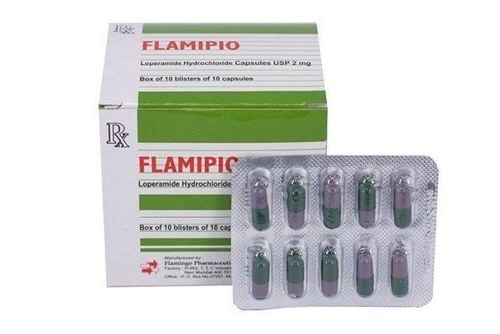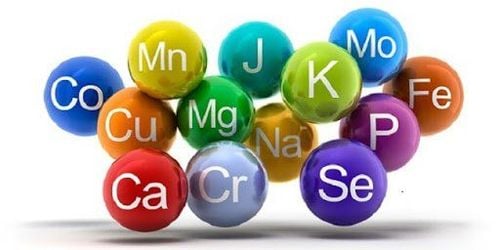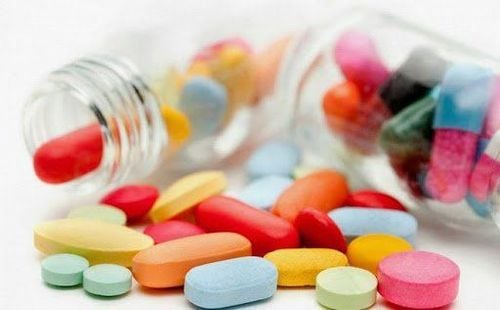This is an automatically translated article.
Constipation is a disease in the digestive tract, occurs quite commonly and occurs in many ages. This pathology is caused by many different causes, in which some drugs cause constipation, which is an undesirable effect when the patient takes it for a long time.
1. Constipation Overview
Constipation is a condition in which stool moves slowly in the digestive tract, leading to difficulty in passing stools and the number of bowel movements is 3 or more days apart. Patients with constipation when going to the toilet are often small, dry and sometimes lumpy, after defecation, there is still a feeling of stool in the intestine. This condition causes long-term accumulation in the body, which easily leads to other diseases such as hemorrhoids, anal fissures, hernias...
Patients with constipation often have the following symptoms:
Want to defecate but difficult or incomplete passing stools. The number of bowel movements suddenly decreases compared to normal (less than 3 times a week). Flatulence or abdominal cramps, the anus is always in a state of fullness. Bleeding with pain when going to the toilet, onset of back pain spread from abdominal distension. Constipation occurs due to many reasons, some of which can be listed as follows:
Constipation drugs: Some drugs often cause unwanted effects such as constipation. Daily diet does not provide enough fiber, contains a lot of fat, especially saturated fat. Not drinking enough water makes stools dry. Drinking a lot of diuretic drinks such as tea, coffee... increases water absorption in the intestines, leading to dry stools. Less exercise and daily movement. Frequently ignoring the feeling of wanting to go to the bathroom or holding back from going to the toilet Having gastrointestinal diseases such as idiopathic rectal enlargement, anal fissure, tumors causing gastrointestinal obstruction...
2. Medications that cause constipation
Many drugs when used for a long time will cause constipation as a side effect. Medications that cause constipation can include the following:
2.1. Opioid analgesics are a group of central analgesics, with strong analgesic effects, so they are used in severe pain, effectively control pain and help improve the quality of life of patients, especially are cancer patients. The drugs in this group such as hydrocodone, codeine, oxycodone, tramadol, morphine... cause constipation when used as a side effect.
The cause of constipation is because opioids reduce secretion in the gastrointestinal tract, decrease intestinal motility, and increase fluid reabsorption from the intestinal mucosa. This process makes stools dry, hard, and difficult to pass. Therefore, patients using drugs in this class often experience abdominal distension, hard stools, and constipation.

Thuốc giảm đau nhóm opioid nằm trong danh sách thuốc gây táo bón
2.2. Iron pills and iron supplements Constipation is one of the most common side effects when taking iron pills and iron supplements, especially iron supplements in pregnant women. The reason is that the body does not completely absorb the oral dose, the excess iron ions in the body when excreted will cause constipation. However, iron and iron supplements come in two forms, inorganic iron and organic iron, of which organic iron does not cause constipation in most users. For inorganic iron-containing drugs, when taken orally, iron ions are rapidly released into the intestinal mucosa, leading to an increase in the concentration of iron ions in the blood. When the body does not absorb all these ions, it will lead to mucosal irritation, heartburn, heartburn and constipation. Organic iron-containing medicinal products are actively and controlled by the intestinal mucosa, according to the body's needs, into the bloodstream. The amount of unabsorbed organic iron salts will be easily eliminated through the digestive tract and will not cause mucosal irritation, constipation... Therefore, it is recommended for patients to supplement with iron and iron-based products. Drink plenty of water and use organic iron to help limit constipation.
Some iron supplements that do not cause constipation contain organic iron salts such as iron fumarate, iron gluconate...
2.3. Group of calcium channel blocker Drugs in the group of calcium channel blockers such as verapamil, diltiazem, nifedipine... are used to treat heart rhythm disorders, hypertension, angina... by the mechanism of relaxation of vascular muscle, including gastrointestinal smooth muscle. Digestive smooth muscle relaxation leads to reduced intestinal contractions, reduced intestinal motility, causing constipation for patients.
2.4. Antacids Drugs in the antacid group, such as the hydroxides of aluminum, magnesium, and calcium, are also known as antacids. This is a group of drugs that have the effect of neutralizing gastric acid, raising the pH of the stomach to approximately 4, so it is indicated in cases of peptic ulcer, Zollinger - Ellison syndrome. In which, medicinal preparations from aluminum hydroxide, if used for a long time, will combine with intestinal mucosal proteins, tighten the intestinal mucosa and cause constipation.
On the contrary, medicinal preparations from magnesium hydroxide used for a long time will cause water retention and have a laxative effect. Therefore, people often combine aluminum hydroxide and magnesium hydroxide in a preparation to limit constipation for patients.
2.5. Antidepressant group For patients with many diseases at the same time, taking a lot of western medicine can cause constipation. In particular, antidepressants such as imipramine, amitryptilin ... act by reducing the secretion and activity of acetylcholine, leading to reduced gastrointestinal spasms, decreased intestinal motility and constipation. Besides, using antidepressants also encountered other side effects such as dry mouth, urinary retention, dry skin, blurred vision...
2.6. Parkinson's disease group of drugs: Digestive system of parkinson patients is often disturbed such as poor absorption of nutrients, poor waste elimination, impaired intestinal motility, so it is easy to become constipated. Combined with that are some drugs to treat parkinson such as benztropin, trihexyphenidyl, orphendrin... acting by anticholinergic mechanism to reduce gastrointestinal spasms, reduce intestinal motility, leading to the common undesirable effect of apples. constipation, glaucoma, dry mouth, blurred vision...

Nhóm thuốc điều trị Parkinson là một trong các loại thuốc gây táo bón
3. Constipation caused by drugs need to do what?
Drug-induced constipation is considered an undesirable effect. Side effects are unpredictable and not all patients experience this. Drugs that cause constipation are often caused by effects on the gastrointestinal tract, reducing intestinal motility, and electrolyte imbalance in the body. Therefore, if the patient experiences constipation while taking the drug, they should inform the treating doctor for appropriate adjustment methods. Absolutely do not arbitrarily use or abuse laxatives, because using these drugs without a doctor's prescription can increase the risk of interactions with the drugs being used. On the other hand, the abuse of laxatives for a long time will reduce the ability of the colon muscle system to function, making it impossible for this muscle system to function when not taking the drug, thereby the patient's constipation. also increased.
In addition, patients with constipation before taking the drug or while taking the drug should take measures to change their lifestyle and activities in a positive direction as follows:
The diet should contain a lot of fiber, including fresh vegetables, tubers and fruits such as cabbage, cauliflower, bananas, apples, sweet potatoes... Fiber from food helps the intestinal system work better, limiting the absorption of water from the stool, helping the stools not hard dry. Replenish enough water for the body by drinking a sufficient amount of water every day (about 1.5 - 2 liters) and should drink a glass of warm water every morning to help regulate the function of the digestive system, limiting the condition. constipation condition. Exercise and sports every day. Limit drinking beverages that stimulate diuretics such as tea, coffee, wine... and eat less spicy foods such as chives, garlic, chili... to limit frequent urination and water absorption. from feces. Using foods that are easy to digest, adding honey, milk, sesame, peach nuts... to your daily diet to help increase the laxative effect. In short, many drugs when used for a long time will cause constipation side effects. Drugs that cause constipation are often caused by effects on the gastrointestinal tract, reducing intestinal motility, and electrolyte imbalance in the body. Therefore, if the patient experiences constipation while taking the drug, they should inform the treating doctor for appropriate adjustment methods.
Please dial HOTLINE for more information or register for an appointment HERE. Download MyVinmec app to make appointments faster and to manage your bookings easily.













